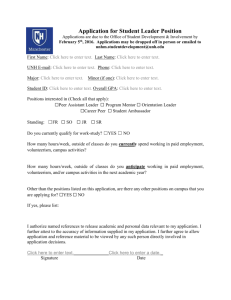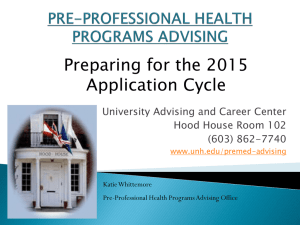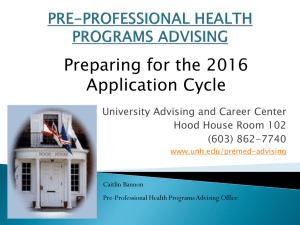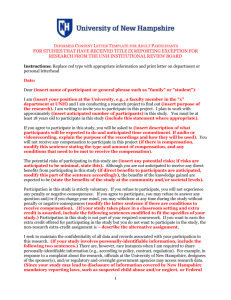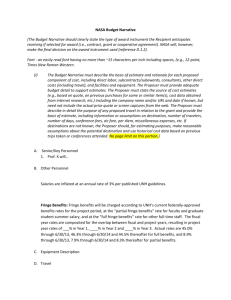Emergency Plan Template
advertisement
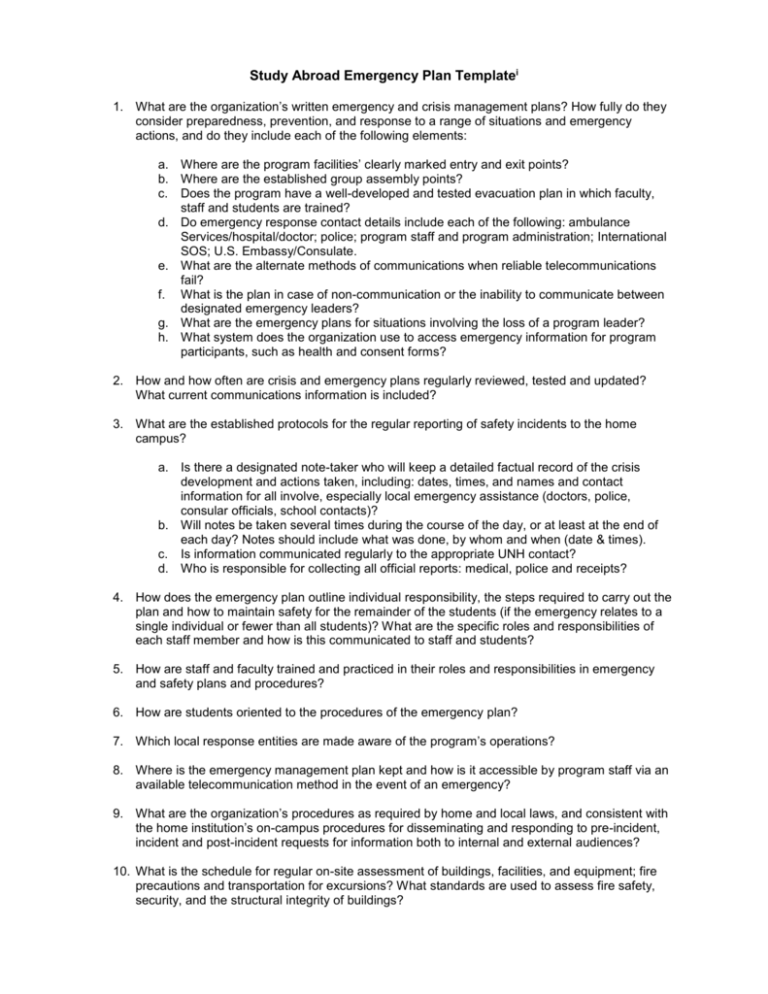
Study Abroad Emergency Plan Templatei 1. What are the organization’s written emergency and crisis management plans? How fully do they consider preparedness, prevention, and response to a range of situations and emergency actions, and do they include each of the following elements: a. Where are the program facilities’ clearly marked entry and exit points? b. Where are the established group assembly points? c. Does the program have a well-developed and tested evacuation plan in which faculty, staff and students are trained? d. Do emergency response contact details include each of the following: ambulance Services/hospital/doctor; police; program staff and program administration; International SOS; U.S. Embassy/Consulate. e. What are the alternate methods of communications when reliable telecommunications fail? f. What is the plan in case of non-communication or the inability to communicate between designated emergency leaders? g. What are the emergency plans for situations involving the loss of a program leader? h. What system does the organization use to access emergency information for program participants, such as health and consent forms? 2. How and how often are crisis and emergency plans regularly reviewed, tested and updated? What current communications information is included? 3. What are the established protocols for the regular reporting of safety incidents to the home campus? a. Is there a designated note-taker who will keep a detailed factual record of the crisis development and actions taken, including: dates, times, and names and contact information for all involve, especially local emergency assistance (doctors, police, consular officials, school contacts)? b. Will notes be taken several times during the course of the day, or at least at the end of each day? Notes should include what was done, by whom and when (date & times). c. Is information communicated regularly to the appropriate UNH contact? d. Who is responsible for collecting all official reports: medical, police and receipts? 4. How does the emergency plan outline individual responsibility, the steps required to carry out the plan and how to maintain safety for the remainder of the students (if the emergency relates to a single individual or fewer than all students)? What are the specific roles and responsibilities of each staff member and how is this communicated to staff and students? 5. How are staff and faculty trained and practiced in their roles and responsibilities in emergency and safety plans and procedures? 6. How are students oriented to the procedures of the emergency plan? 7. Which local response entities are made aware of the program’s operations? 8. Where is the emergency management plan kept and how is it accessible by program staff via an available telecommunication method in the event of an emergency? 9. What are the organization’s procedures as required by home and local laws, and consistent with the home institution’s on-campus procedures for disseminating and responding to pre-incident, incident and post-incident requests for information both to internal and external audiences? 10. What is the schedule for regular on-site assessment of buildings, facilities, and equipment; fire precautions and transportation for excursions? What standards are used to assess fire safety, security, and the structural integrity of buildings? 11. Issue Specific Plansii: a. If a student is sexually assaulted or otherwise becomes a crime victim, do you know how to take the following steps: i. Obtain immediate medical attention for the student? ii. Is reporting the incident to local authorities the appropriate course of action in the program location? iii. Report the incident to the home campus and seek further guidance? iv. For their safety, advise other program participants about the basics of the incident while preserving the victim’s privacy? v. Seek emergency psychological counseling as needed, including UNH SHARPP (Sexual Harassment and Rape Prevention Program)? b. If a program participant is accused of misconduct, do you know how to: i. Provide appropriate officials on the home campus with documentation relevant to the alleged violation? ii. Consult the home campus about recommended actions, including whether the accused student can or should be removed from the program and how that will impact the student’s status at UNH? iii. Comply with any due process requirements under the UNH Student Rules, Rights and Responsibilities, such as giving the accused student notice and an opportunity to be heard? iv. Inform everyone involved that retaliation will not be tolerated and could in itself justify removal from the program? v. Is there a plan of how the program will separate temporarily or remove permanently a student if necessary and under what circumstances? c. Medical injury / illness i. What are the recommended medical facilities for: 1. common ailments such as flu, food poisoning, sprained limbs, etc. 2. broken bones and minor surgeries, such as appendicitis 3. 24/7 emergency room 4. ambulance services 5. pharmacy that provides quality service and staff who speak English ii. Are all these addresses and phone numbers collected, distributed to students and accessible to leadership in the event of an emergency? iii. Who will accompany the student to seek medical attention? Who will be able to remain with the student to act as their advocate? iv. Does the program leader have access to students’ health disclosure and insurance information, kept in a private place, in the event that the student cannot provide a health history? d. Mental health incidences i. Has the program established a relationship with an English-speaking psychiatrist or psychologist who is familiar with mental health issues that are common to U.S. students, such as depression, anxiety, and eating disorders? ii. If a student would need to be hospitalized for mental health issues, which is the preferred facility? iii. Are all these addresses and phone numbers collected, distributed to students and accessible to leadership in the event of an emergency? e. Missing student for more than 24 Hours i. Will program staff be able to: 1. contact the student, friends and associates via cell phone/text message, email, facebook? 2. notify UNH at once, deciding who should contact emergency contact? 3. know whom to notify in the U.S. consulate, local police, and local sponsor(s)? 4. access quickly the student’s picture, birth date, and passport details? f. Arrested student i. Does the program have on file contact information for the U.S. consulate and local law enforcement to notify them immediately? 2 ii. Who is designated to notify UNH about the incident as soon as possible? iii. Who will call contact student’s emergency contacts if the student is unable? iv. Who will visit the student in jail to provide comfort, determine what happened and help them access legal counsel. v. How to assist the student in obtaining funds for bail? g. Student death i. Call UNH Police Dispatch immediately to activate the University Emergency Group ii. DO NOT CALL THE NEXT OF KIN. UNH has established protocols for this iii. The death of student is determined ONLY by identifying the remains. Until this is done, there should be no communication about the death of a student except with UNH administration. iv. How will this be addressed with the group in terms of official communication, group meetings, counseling availability and class attendance? h. Natural Disaster/terrorism i. Does your host city have a history of experiencing these types of incidences? For example, is the city is prone to earth quakes or floods? ii. If so, what are the emergency plans for the host city and host institution? iii. How will the program fit into these plans? iv. What is the plan if the program needs to be relocated to another part of the city or another town? v. What is the plan if the program needs to be closed and faculty and students evacuated? vi. Are students informed so that they know what to do in the event of such an incident? i. Public health crisis i. What is the institutions plan for influenza? ii. How will the program facilitate isolating students if they cannot remain in their accommodation due to concerns of contagions? j. Program Suspension and Evacuation i. Is it known that as of 2011, it is official UNH policy that decisions on program suspension and evacuation will be made by the UNH International Travel Risk Review Committee (ITRCC) based on careful examination of facts from a variety of resources. More information is available at: http://www.unh.edu/cie/unh_intl_policies/index.html. 12. General UNH Emergency Information a. UNH Emergency Contact Numbers: UNH 24 Hour Emergency Dispatch: 1-603-862-1427 International SOS Alarm Center: 1-800-523-6586; Call collect: 1-215-942-8226; UNH's membership number: 11BCAS000009 UNH SHARPP 24-hour Help Line: 1-603-862-SAFE (7233) CIE: 1-603-862-2398; CIE Emergency Contact Number: 1-603-767-8547 13. General advice in a crisis situation a. Your first responsibility is the safety and well-being of program participants. Do whatever is necessary, whether this means obtaining prompt and appropriate medical attention or obtaining International SOS, embassy or police intervention. b. Make sure ALL members of the group are accounted for and safe and have an assigned person in charge. c. Remain as calm as possible. d. Do your best to diffuse any growing anxieties that may be occurring among students. e. Immediately after doing everything possible to assure participants' safety, contact your department chair/Dean, CIE, UNH Dispatch, or International SOS, depending on the circumstances. f. UNH must be notified as soon as possible even if the situation is being taken care of. 3 i Based on Standards of Good Practice for Education Abroad, http://www.forumea.org/documents/ForumEAStandardsGoodPractice2011-4thEdition.pdf, Sect 2:24. ii Based on United Educators Checklist for Leaders of Short-term International Programs, http://www.unh.edu/cie/faculty/risk_mgt.html. 4
